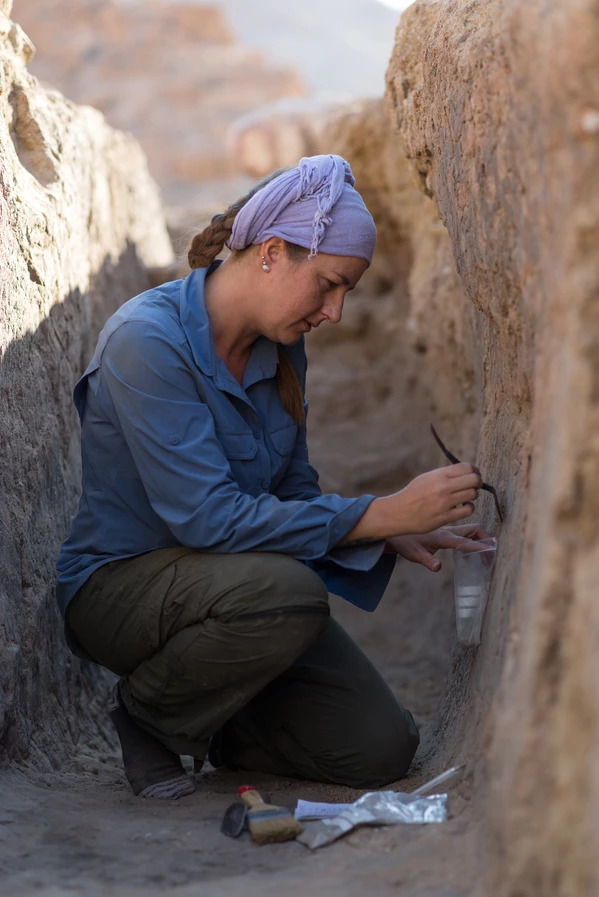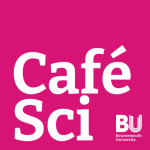Sarah Elliott below shares her experience of presenting at a BU Café Scientifique event on 1 December 2020. Note – the recording below includes only Sarah’s talk and not the Q&A session that followed. We chose not to record the Q&A in the hope that it would encourage questions, but we may review this policy in future.
I recently participated in Café Scientifique which, because of the current pandemic, has moved on-line. I think this is a great opportunity to be involved in and for viewers across the country to engage in scientific research.
I presented some of my PhD results that form the basis of my current postdoctoral research fellowship, which I hold in the Archaeology & Anthropology department at Bournemouth University. My research sits within the discipline of Environmental Archaeology – I study microscopic signatures of human and animal activity from the soils and sediments in farming villages dating from 12,000-7,000 years ago in the Middle East. These villages and the people who resided in them were the first farmers in the world, domesticating plants and animals in an area called the Fertile Crescent.
My research takes a novel approach to identifying animal domestication and human activities/signatures. There is so much on archaeological sites that we cannot see, but which we are able to pick apart microscopically, I examine microscopic faecal spherulites which are produced in the animals’ gut during digestion and are a key indicator of animal dung. Evidence from the animal dung can help with identifying management and domestication of animals, in addition to identifying the use of ‘secondary products’, for example dung being used for fuel and within building materials. Furthermore, I examine geochemical signatures from the sediments as well as identifying microscopic plant remains, in the form of silica phytoliths. Studying animal dung as a specialism is an unusual topic, but presenting in this Café Sci environment makes people (I think) look at things in a different way.
I participated in Café Sci because I enjoy sharing my research, and more importantly I think it is key for people to know why this topic, and this major transitional period, is significant. During this period, people shifted from mobile hunter-gatherers to sedentary farmers – this was a major change in human history; with the advent of food production and farming came the development of villages, towns, civilisations that led us to where we are today.
Academics spend a lot of time presenting their research to each other and publishing their data, but through Café Sci as a platform you are able to reach a wider audience and facilitate discussions about your research in an informal and friendly environment.
The event had a good turn out and very positive feedback, the questions asked in the discussion were all thought provoking and important points were highlighted upon which I could expand my explanations. Academics always have so much to say, and not enough time to say it, so the ample time given for discussion at a Café Sci event provides a real opportunity to focus on the aspects of the talk which the public were most interested in.
Sarah Elliott

 Café Scientifique Tuesday 1 Dec – Discovering the World’s First Farmers
Café Scientifique Tuesday 1 Dec – Discovering the World’s First Farmers Engaging online: Café Scientifique
Engaging online: Café Scientifique










 From Sustainable Research to Sustainable Research Lives: Reflections from the SPROUT Network Event
From Sustainable Research to Sustainable Research Lives: Reflections from the SPROUT Network Event REF Code of Practice consultation is open!
REF Code of Practice consultation is open! BU Leads AI-Driven Work Package in EU Horizon SUSHEAS Project
BU Leads AI-Driven Work Package in EU Horizon SUSHEAS Project ECR Funding Open Call: Research Culture & Community Grant – Apply now
ECR Funding Open Call: Research Culture & Community Grant – Apply now ECR Funding Open Call: Research Culture & Community Grant – Application Deadline Friday 12 December
ECR Funding Open Call: Research Culture & Community Grant – Application Deadline Friday 12 December MSCA Postdoctoral Fellowships 2025 Call
MSCA Postdoctoral Fellowships 2025 Call ERC Advanced Grant 2025 Webinar
ERC Advanced Grant 2025 Webinar Update on UKRO services
Update on UKRO services European research project exploring use of ‘virtual twins’ to better manage metabolic associated fatty liver disease
European research project exploring use of ‘virtual twins’ to better manage metabolic associated fatty liver disease